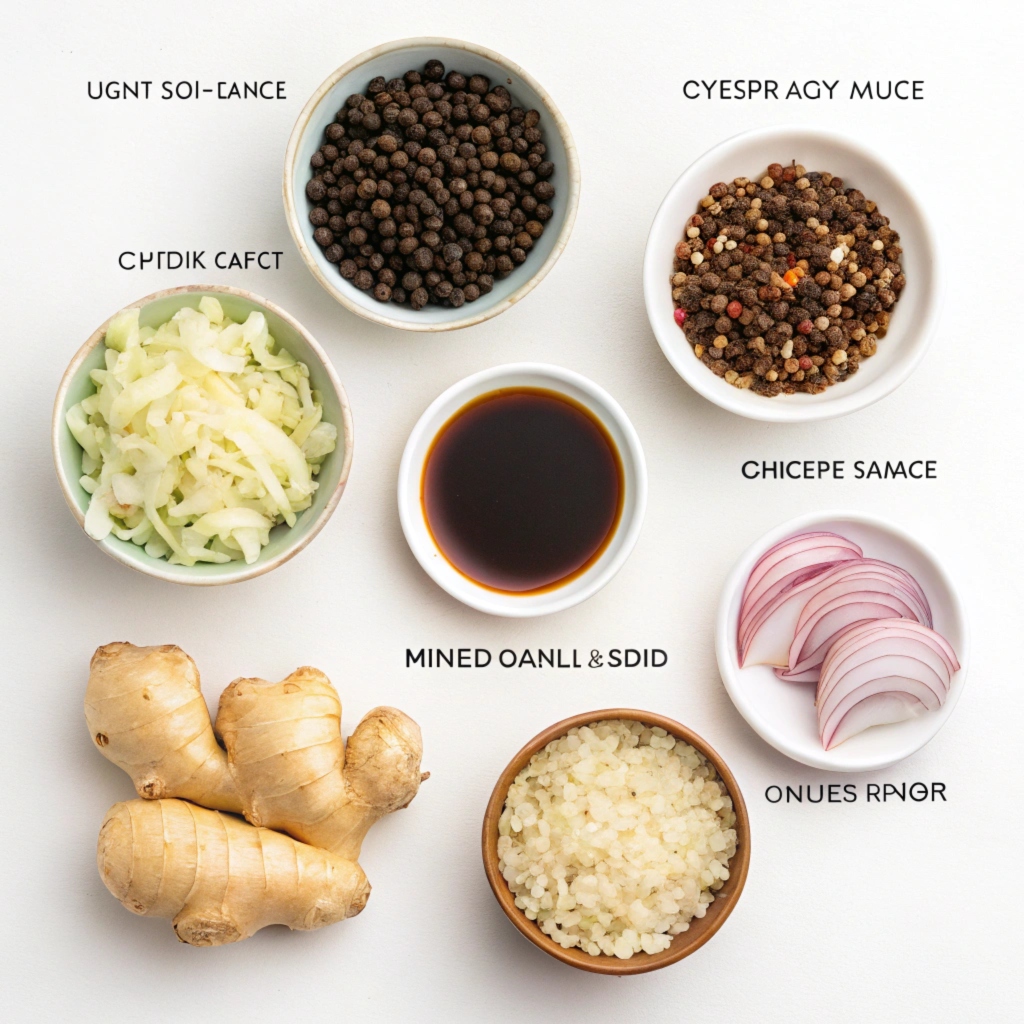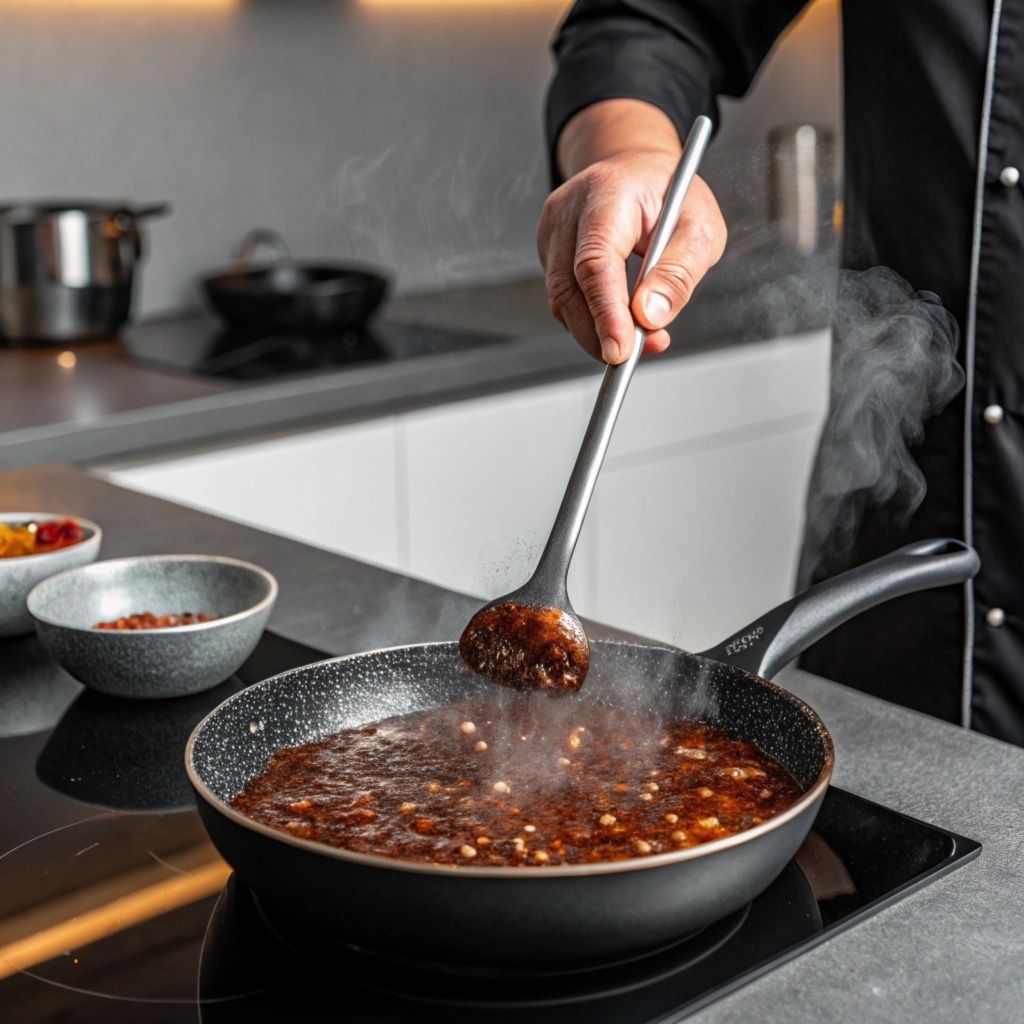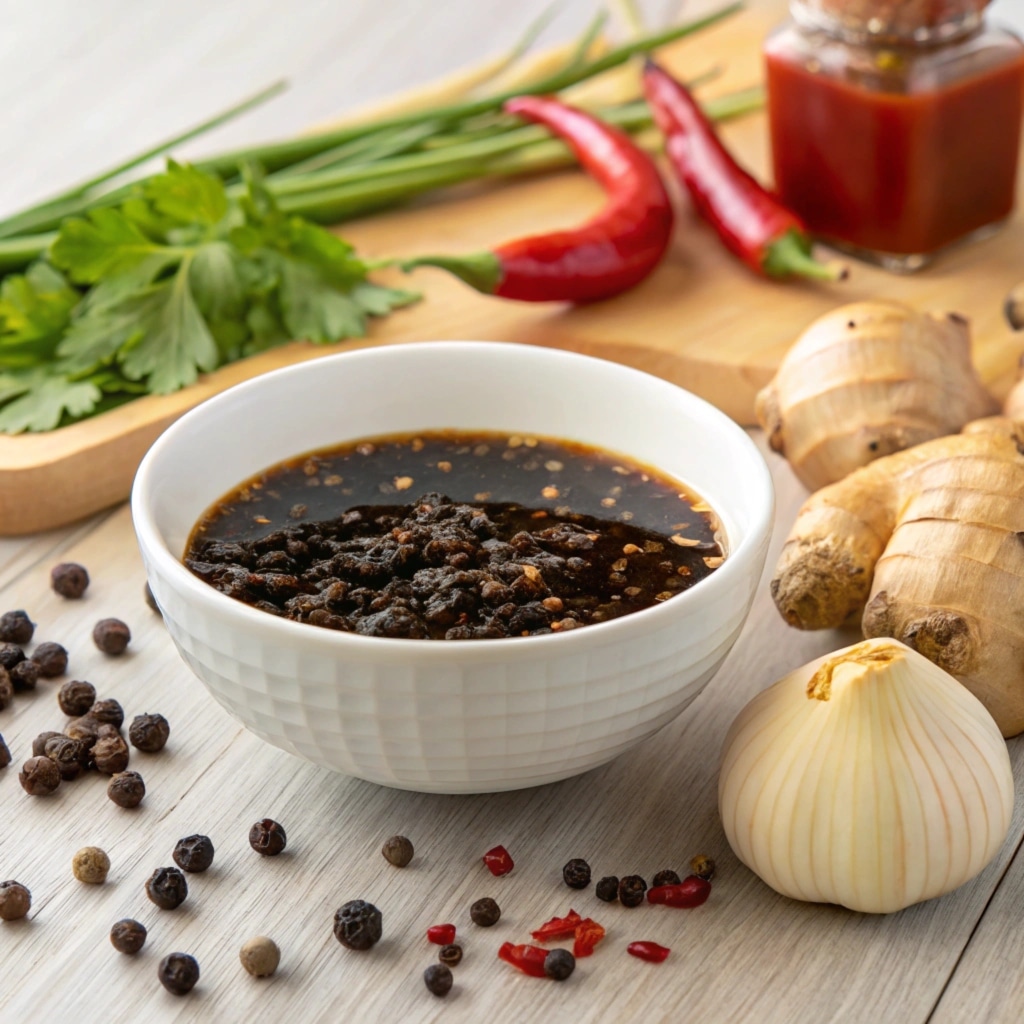Chinese black pepper sauce is a culinary gem celebrated for its bold, earthy, and slightly spicy flavor. This rich sauce, a staple in Chinese cuisine, is known for its ability to elevate any dish with its complex taste profile. Whether paired with tender beef slices, tossed with stir-fried vegetables, or drizzled over noodles, it never fails to impress.
Key Ingredients in Chinese Black Pepper Sauce

The distinctive taste of Chinese black pepper sauce comes from a harmonious blend of carefully chosen ingredients. Each component contributes to the sauce’s rich, complex flavor profile, making it a versatile addition to countless dishes.
Black Pepper: The Star Ingredient
At the heart of Chinese black pepper sauce is its namesake spice: black pepper. Known for its warm, earthy, and slightly spicy flavor, freshly ground black pepper is the key to the sauce’s bold and aromatic character. The coarse grind of the peppercorns not only enhances the taste but also adds a subtle texture to the sauce.
Soy Sauce and Oyster Sauce: Umami Boosters
Soy sauce and oyster sauce are two fundamental ingredients that bring depth and umami to the sauce.
- Soy Sauce: A staple in Chinese cooking, soy sauce provides a salty and slightly tangy base that balances the sharpness of the black pepper. Light soy sauce is typically used for a more delicate flavor, but dark soy sauce can be added for a richer, darker color.
- Oyster Sauce: Made from oyster extracts, this ingredient lends a subtle sweetness and a deep savory flavor that complements the spiciness of black pepper. It is a vital component that gives the sauce its characteristic richness.
Aromatics: Garlic, Ginger, and Onion
No Chinese sauce is complete without a medley of aromatics. Garlic, ginger, and onion serve as the aromatic trio in black pepper sauce, adding layers of flavor that make the sauce truly memorable.
- Garlic: Enhances the overall taste with its pungent and slightly sweet profile.
- Ginger: Adds a mild heat and a touch of freshness.
- Onion: Provides sweetness and body, contributing to the sauce’s smooth consistency.
Other Supporting Ingredients
In addition to the primary components, several supporting ingredients are often used to perfect the flavor and texture of Chinese black pepper sauce:
- Corn Starch: Acts as a thickening agent, ensuring the sauce achieves a silky consistency.
- Sesame Oil: A drizzle of sesame oil adds nuttiness and enhances the aroma.
- Sugar: A small amount of sugar is sometimes added to balance the heat and saltiness.
- Chicken or Beef Stock: Used to dilute the sauce while adding a savory base that blends well with the other ingredients.
Optional Additions for Customization
To cater to specific tastes or dietary needs, additional ingredients can be incorporated:
- Chili Flakes or Hot Sauce: For an extra kick of heat.
- Vegetarian Alternatives: Mushroom-based soy sauce or plant-based oyster sauce can be used for vegan versions.
- Citrus Zest: A hint of lemon or lime zest adds a bright, tangy note for a creative twist.
With the right combination of these ingredients, Chinese black pepper sauce achieves its signature balance of spiciness, umami, and aromatic complexity.
How to Make Chinese Black Pepper Sauce at Home

Creating Chinese black pepper sauce at home is a rewarding experience that allows you to customize the flavors to your liking. With a few simple ingredients and a step-by-step guide, you can prepare this versatile sauce from scratch.
Ingredients You’ll Need
Before you begin, gather the following ingredients for a classic Chinese black pepper sauce:
- Black Pepper: 2 tablespoons of freshly ground black pepper (adjust to taste).
- Soy Sauce: 3 tablespoons of light soy sauce.
- Oyster Sauce: 2 tablespoons for richness.
- Garlic: 4 cloves, minced.
- Ginger: 1 teaspoon, finely grated.
- Onion: ½ cup, finely chopped.
- Corn Starch: 1 tablespoon, mixed with 2 tablespoons of water (slurry).
- Sugar: 1 teaspoon for balance.
- Sesame Oil: 1 teaspoon for fragrance.
- Chicken or Beef Stock: 1 cup for the base.
- Vegetable Oil: 2 tablespoons for sautéing.
Step-by-Step Guide
Follow these steps to prepare a perfectly balanced Chinese black pepper sauce:
Prepare the Aromatics
- Heat the vegetable oil in a skillet or saucepan over medium heat.
- Add the minced garlic, grated ginger, and diced onion. Sauté until fragrant and the onions turn translucent, about 2–3 minutes.
Toast the Black Pepper
- Add the freshly ground black pepper to the skillet and stir for about 30 seconds to release its aroma. This step is crucial for intensifying the peppery flavor.
Incorporate the Liquid Ingredients
- Pour in the soy sauce, oyster sauce, and chicken or beef stock. Stir well to combine.
- Add sugar to balance the flavor, and let the mixture come to a gentle simmer.
Thicken the Sauce
- Gradually add the corn starch slurry while stirring continuously to avoid lumps.
- Continue cooking until the sauce thickens to your desired consistency, usually about 1–2 minutes.
Finish with Sesame Oil
- Remove the skillet from the heat and drizzle in the sesame oil. Stir to combine, and your sauce is ready to serve!
- Cooking Tips for Perfect Consistency
- Adjust the Thickness: Add more stock if the sauce is too thick or more corn starch slurry if it’s too thin.
- Enhance the Flavor: Taste the sauce before serving and adjust the seasoning as needed. A splash of soy sauce or a pinch of sugar can fine-tune the balance.
- Avoid Overcooking: Black pepper loses its aroma if overcooked. Add it early but avoid prolonged cooking times.
Common Variations
For a personalized touch, consider these variations:
- Spicy Version: Add chili flakes or a dash of chili oil for extra heat.
- Vegetarian Option: Substitute oyster sauce with a mushroom-based alternative and use vegetable stock instead of chicken or beef stock.
- Creamy Twist: Stir in a splash of coconut milk for a milder, creamier version of the sauce.
Serving Suggestions
Once prepared, the sauce can be poured over grilled meats, mixed with stir-fried vegetables, or used as a dip. It’s a versatile condiment that complements countless dishes.
Pairing Chinese Black Pepper Sauce with Dishes
Chinese black pepper sauce is a versatile condiment that can transform an array of dishes, from traditional Chinese recipes to contemporary fusion creations. Its bold flavor profile makes it an ideal partner for proteins, vegetables, and even unique culinary experiments.
Best Dishes to Serve with Chinese Black Pepper Sauce
Stir-Fried Beef with Black Pepper Sauce
One of the most iconic dishes, stir-fried beef with black pepper sauce, highlights the sauce’s ability to complement tender cuts of meat. Thin slices of beef are marinated and quickly stir-fried, then coated in the sauce for a savory and peppery finish.
Black Pepper Chicken
This dish features juicy chicken pieces, often stir-fried or grilled, smothered in the rich sauce. The robust flavor of the sauce pairs beautifully with the mildness of the chicken.
Seafood Pairings
Shrimp, scallops, or fish filets cooked in black pepper sauce offer a delightful balance of umami and spice. The sauce enhances the natural sweetness of seafood, making it a favorite for seafood lovers.
Black Pepper Vegetables
For vegetarians, stir-fried broccoli, bell peppers, and mushrooms tossed in black pepper sauce deliver a satisfying dish packed with flavor. Adding tofu or tempeh makes it even more hearty and nutritious.
Noodles and Rice Dishes
Black pepper sauce works wonderfully in noodle stir-fries and rice dishes. Drizzle it over fried rice or mix it with udon, chow mein, or even spaghetti for a unique twist.
Regional Variations in Pairings
Cantonese Influence
In Cantonese cuisine, black pepper sauce is frequently used as a glaze for roasted meats like duck. The combination of crispy textures and the sauce’s bold flavors creates a mouthwatering dish.
Fusion Dishes
Black pepper sauce has found its way into global cuisines, appearing in dishes like black pepper steak, black pepper lamb chops, or even burgers and sliders for a modern twist.
Creative Fusion Ideas
Black Pepper Tacos
Use black pepper sauce as a marinade for grilled beef or chicken, then layer it into soft tortillas with crunchy vegetables for an Asian-Mexican fusion taco.
Black Pepper Pizza
Drizzle the sauce over a pizza topped with grilled chicken, bell peppers, and onions for a flavorful and unconventional option.
Black Pepper Pasta
Mix the sauce with pasta, adding vegetables or meat for a spicy, umami-packed dish reminiscent of Italian and Asian culinary techniques.
Tips for Maximizing Pairings
- Balance the Flavors: Pair bold-flavored dishes with lighter side items like steamed rice or plain noodles to balance the meal.
- Experiment with Textures: Use the sauce with crispy fried foods like spring rolls or tempura for a contrasting experience.
- Adjust Heat Levels: For sensitive palates, use less black pepper or balance the sauce with additional sugar or sesame oil.
Chinese black pepper sauce’s adaptability makes it an indispensable ingredient for both traditional recipes and modern fusion dishes. With a little creativity, you can use it to elevate everyday meals into extraordinary culinary experiences.
Health Benefits and Nutritional Value of Chinese Black Pepper Sauce
Chinese black pepper sauce isn’t just about bold flavors it also comes with several health benefits and a decent nutritional profile, thanks to its carefully selected ingredients. By understanding its components, you can enjoy this sauce while making informed dietary choices.
Nutritional Breakdown of Ingredients
Black Pepper
The primary ingredient, black pepper, is a powerhouse of nutrients. It contains:
- Piperine: An active compound known for its antioxidant and anti-inflammatory properties.
- Minerals: Includes potassium (essential for heart health), magnesium (important for bone health), and iron (crucial for oxygen transport in the blood).
- Low Calories: Black pepper is naturally low in calories, making it an excellent spice for health-conscious eaters.
Soy Sauce
While soy sauce adds depth and umami, it is also a significant source of sodium. Moderation is key to enjoying its benefits without overloading on salt.
- Amino Acids: Beneficial for muscle repair and overall health.
- Low in Calories: A small amount goes a long way in flavoring food without adding significant calories.
Oyster Sauce
Oyster sauce enhances the dish’s richness and provides key nutrients:
- Trace Minerals: Contains zinc, which supports immune function.
- Natural Sweetness: A small amount of sugar in oyster sauce balances the dish without the need for added sweeteners.
Garlic, Ginger, and Onion
These aromatics are not only flavor enhancers but also bring numerous health benefits:
- Garlic: Known for its antibacterial and heart-protective properties.
- Ginger: Reduces inflammation and aids digestion.
- Onion: Packed with antioxidants and beneficial for heart health.
Health Benefits of Black Pepper Sauce
1. Digestive Aid
The piperine in black pepper stimulates the secretion of digestive enzymes, improving the breakdown and absorption of nutrients.
2. Antioxidant Properties
Black pepper contains antioxidants that combat free radicals in the body, potentially reducing the risk of chronic diseases like cancer and heart disease.
3. Anti-Inflammatory Effects
Piperine and ginger in the sauce have anti-inflammatory properties, which may help in managing conditions like arthritis.
4. Boosts Metabolism
Black pepper is known to slightly enhance metabolic rate, aiding in weight management when consumed as part of a balanced diet.
5. Heart Health
The sauce’s ingredients, particularly garlic and onion, have been linked to better heart health by improving cholesterol levels and reducing blood pressure.
Tips for a Healthier Version
Lowering Sodium
- Opt for low-sodium soy sauce to reduce the salt content without compromising flavor.
- Use homemade broth instead of stock cubes, which often contain added sodium.
Reducing Sugar
- Substitute refined sugar with natural sweeteners like honey or coconut sugar.
- Use less oyster sauce if you prefer a less sweet taste.
Adding More Vegetables
- Blend pureed vegetables like carrots or bell peppers into the sauce to increase its nutrient density while maintaining a smooth texture.
Controlling Fat Content
- Replace sesame oil with a lighter option, like avocado oil, or reduce the quantity slightly.
- Use a non-stick pan to sauté the ingredients with minimal oil.
Balancing Flavor and Health
The rich flavor of Chinese black pepper sauce makes it easy to incorporate into healthy dishes without the need for excessive seasoning. By focusing on fresh, high-quality ingredients and making small adjustments, you can enjoy this sauce guilt-free as part of a balanced diet.
Tips for Storing and Preserving Chinese Black Pepper Sauce
Proper storage is crucial to maintain the flavor, texture, and freshness of Chinese black pepper sauce, whether it’s homemade or store-bought. By following the right techniques, you can extend the shelf life and enjoy its robust taste over time.
Proper Storage Techniques
For Homemade Black Pepper Sauce
- Airtight Containers: Store the sauce in a clean, airtight container to prevent exposure to air and moisture, which can lead to spoilage.
- Refrigeration: Always refrigerate homemade sauce immediately after cooling to preserve its freshness.
- Use Clean Utensils: Avoid contamination by using clean spoons or utensils when scooping out the sauce.
For Store-Bought Sauce
- Original Packaging: Keep the sauce in its original packaging until opened. Ensure the cap or lid is tightly sealed after each use.
- Refrigerate After Opening: Most store-bought black pepper sauces should be refrigerated after opening, as stated on the label.
Shelf Life of Homemade vs. Store-Bought
Homemade Sauce
- Refrigerated: Can last for up to 1–2 weeks when stored properly in the refrigerator.
- Freezing: Homemade black pepper sauce can be frozen for up to 3 months. Use freezer-safe containers or ice cube trays to portion the servings.
Store-Bought Sauce
- Unopened: Typically has a shelf life of 6–12 months when stored in a cool, dry place.
- Opened: Can last for 1–2 months in the refrigerator, depending on the brand and preservatives used.
Freezing and Reheating Guidelines
Freezing the Sauce
- Portion Control: Divide the sauce into small portions using freezer-safe containers or silicone ice cube trays. This prevents the need to thaw a large batch.
- Labeling: Clearly label the container with the date of freezing to track freshness.
Reheating the Sauce
- Thawing: Thaw frozen sauce in the refrigerator overnight for best results.
- Reheat Gently: Warm the sauce in a saucepan over low to medium heat, stirring occasionally to prevent burning. Add a splash of water or stock if the sauce thickens too much during freezing.
Signs of Spoilage
Homemade Sauce
- Off Odor: A sour or rancid smell is a sign that the sauce has spoiled.
- Mold Growth: Discard the sauce immediately if you notice any mold on the surface or lid.
- Color Changes: Significant discoloration may suggest spoilage, especially if the sauce appears unusually dark or cloudy.
Store-Bought Sauce
- Expiration Date: Always check the expiration date before using.
- Unusual Texture: If the sauce becomes clumpy or excessively watery, it’s best to discard it.
- Odd Taste: A metallic or bitter taste is a sign that the sauce is no longer safe to consume.
Prolonging Freshness
- Avoid Temperature Fluctuations: Consistent refrigeration helps maintain the sauce’s quality.
- Store Away from Light: Direct light can degrade the flavor and color of the sauce, so keep it in a dark or opaque container.
- Preserve Small Batches: When making homemade sauce, prepare small batches that can be consumed quickly to reduce the risk of spoilage.
By following these storage and preservation tips, you can ensure that your Chinese black pepper sauce remains flavorful and ready to enhance your favorite dishes.

